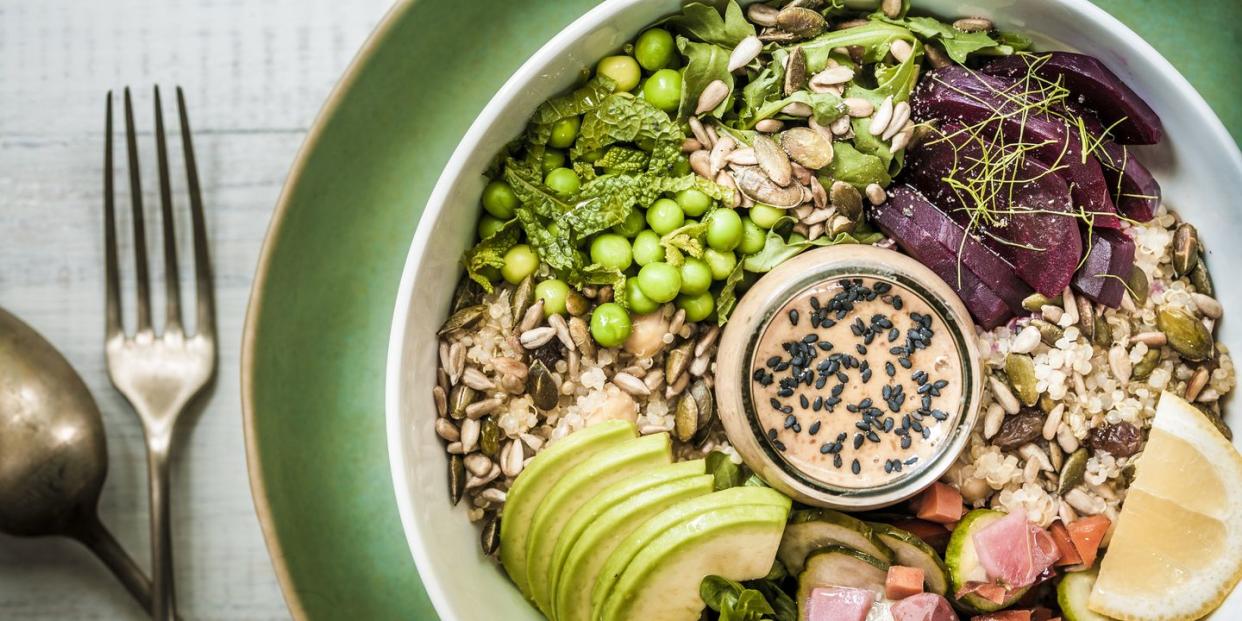Your Vegetarian Friends Might All Follow Slightly Different Versions Of The Diet

Eating more plants is pretty much a no-brainer: Research shows that people who stick to plant-based diets have lower cholesterol and blood pressure levels, not to mention the lifestyle choice is way better for the environment.
But when it comes to dedicating yourself to a specific plant-forward diet, how do you know which variety is best for you? Vegan? Vegetarian? And what's the difference between the two? Because, honestly, they seem pretty dang similar...
Look no further than this vegan vs. vegetarian guide for answers to all your veggie questions.
So, what’s a vegetarian diet?
“A vegetarian diet is pretty much the easiest way to make the switch to eating more plants and vegetables, but it’s important to note that there are varying levels of vegetarianism,” says Marisa Moore, RD. Traditionally, vegetarians don’t eat meat sources like chicken or beef, and sometimes don’t eat items that are made from animal parts (such as bone broth) either. "Some vegetarians eat both eggs and dairy, some one or the other," says Moore. And some add in some fish from time to time, too. People who fall into this camp (generally referred to as pescatarians) may still consider themselves vegetarian—it really just depends on the person you ask.
These are all various takes on traditional vegetarian diet:
Lacto-ovo vegetarian: No meat, poultry, seafood, or other meat products. Will eat eggs and dairy products.
Lacto-vegetarian: No meat, poultry, seafood, other meat products, or eggs. Will eat dairy products.
Pescatarian: No meat, poultry, or other meat products. Will eat seafood, eggs, and dairy.
How does this differ from a vegan diet?
Vegan diets generally cut out more items than vegetarian diets do, but that doesn’t mean all you’re eating is kale. “Veganism is the omission of all animal products, so very strict vegans definitely don’t eat meat, seafood, or eggs," says Emily Wood, RD. And many don't eat honey or gelatin, either.
Vegans also tend to be more conscientious of cross-contamination—meaning they won't eat food that's come in contact with animal by-products (think: sautéeing veggies in a pan that had chicken, or a vegan product processed in the same facility as dairy). That said, this varies from person to person, and many vegetarians are diligent about types of cross-contamination, too.
“Some vegans also extend their diet views to their lifestyle choices, which means they don’t buy leather and wool clothing or accessories, and avoid cosmetics and soaps that have been tested on animals.”
Still, the biggest differentiator is that vegans tend to give up ALL animal products, plus animal by-products. But course, there are no hard and fast rules, and you can adapt the vegan diet to meet your needs. Some iterations on a vegan diet include:
Beegan: A vegan person who eats honey.
Raw vegan: A vegan who only eats raw, unprocessed, plant-based foods.
What on earth is a plant-based diet, then?
“Honestly, it depends on who you ask!” says Moore, who is all for the flexibility a plant-based diet provides. “Some people use the term to describe veganism, some to describe vegetarianism—some even use it to describe a diet that is mostly plants, but still has a bit of chicken or fish in it now and then.” One main criteria, though, is that a plant-based diet mostly focuses on whole, unprocessed foods, since it’s entirely driven by the health benefits of a plant-first diet.
“I would say that plant-based eating definitely offers the most flexibility,” says Wood.
How do you decide the best one for you?
“There’s honestly no right answer—it's very individual,” says Wood, who counsels several clients on this exact query every single day. “Identify what you want to get out of it," she adds.
Are you looking to lower your cholesterol or reduce your carbon footprint, but not ready to ditch cheese? Go for vegetarian. Do you want to be more mindful about animal treatment? Look into veganism. Are you eager to limit your meat intake, but not quite ready to nix it entirely? A more flexible, plant-based diet may be for you.
Consider your "why," and go from there. If you're really stumped, though, Wood recommends getting some guidance from a nutritionist to choose a diet that works for your goals and lifestyle.
Curious which of your favorite celebs don't eat meat? Check out these vegan stars:
How do you start adopting a vegan or vegetarian diet?
“Definitely don’t go cold turkey,” advises Wood, who says that cutting out too many food items at once will simply make you feel too deprived to stick to the diet long-term. Instead, cut maybe one food at a time, or reduce your portions of meat gradually, all while adding more plant-based sources of protein, such as beans and nuts. “And add more vegetables, since it’ll naturally make you eat less of the other stuff,” adds Wood.
If you want additional tips on how to make the change, and make it stick, check out the Women's Health guide on how to go vegan.
You Might Also Like